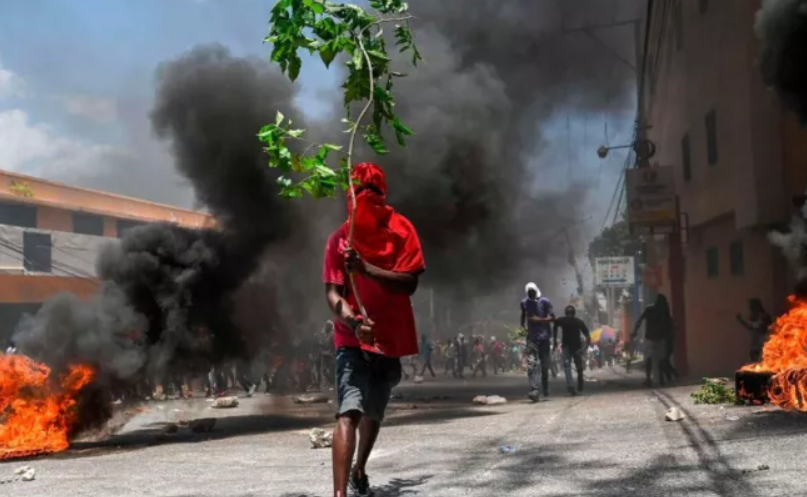UN Evacuates Staff from Haiti Amid Escalating Gang Violence
The security situation in Haiti has deteriorated sharply in recent weeks, forcing the United Nations (UN) and several foreign embassies to evacuate personnel from the capital, Port-au-Prince. The surge in gang-fueled violence, coupled with targeted attacks on key infrastructure, has left the city in turmoil, disrupting aid efforts and threatening the lives of millions.
UN Staff Evacuated as Violence Escalates
The UN began evacuating its staff from Port-au-Prince following a spike in violent clashes between armed gangs, police forces, and civilians. Reports indicate that the unrest has reached critical levels, prompting the use of UN helicopters to airlift evacuees in groups of 14 to the northern city of Cap-Haitien. Some evacuees are expected to leave the country altogether.
The decision follows the closure of Port-au-Prince’s main international airport earlier this month, after commercial flights were targeted by gunfire during landing and takeoff. The violence has rendered air travel increasingly unsafe, compounding the challenges faced by international organizations operating in the country.
In a related move, a United States Air Force C-130 aircraft landed in the capital over the weekend to evacuate American diplomats, as directed by the US Southern Command. The US embassy has significantly reduced its presence, aligning with actions taken by other foreign missions that have scaled back operations amid the escalating unrest.
UN Reaffirms Commitment to Haiti
Despite the evacuation, the UN has assured Haitians that its support remains unwavering. “The United Nations is not leaving Haiti. Our commitment to the Haitian people remains steadfast,” said Stéphane Dujarric, spokesperson for the UN Secretary-General.
He explained that while the organization is temporarily reducing its presence in the capital, essential humanitarian programs and support for Haitian authorities will continue. Some staff are being relocated to safer areas within the country, while others will work remotely to sustain critical operations.
Healthcare and Humanitarian Efforts Under Threat
The violence has also crippled Haiti’s already fragile healthcare system. Doctors Without Borders (MSF), a key provider of medical services in Port-au-Prince, announced last week that it was suspending operations due to threats against its staff and patients. The organization cited incidents of intimidation, including threats of rape and death, as reasons for its withdrawal.
“Every day we cannot resume activities is a tragedy,” said Christophe Garnier, MSF’s mission director in Haiti. The suspension of MSF’s services leaves thousands without access to critical healthcare, further exacerbating the country’s humanitarian crisis.
Food security has also taken a hit. Food for the Poor (FFTP), which runs feeding programs across Haiti, reported that gang activity and roadblocks have made food deliveries nearly impossible. The closure of the airport and limited access to seaports have compounded the issue, creating logistical nightmares for aid organizations.
Mario Nicoleau, FFTP’s Haiti director, expressed concern about dwindling fuel supplies needed for food delivery trucks. “While fuel availability seems to be improving, the persistent violence and displacement of residents continue to hinder operations,” he said.
Police and International Missions Under Scrutiny
In an effort to combat the growing influence of gangs, a 430-strong UN-backed Multinational Security Support Mission (MSS), primarily comprised of Kenyan police, has been working alongside Haiti’s police forces. However, the mission has faced criticism over its handling of the escalating violence.
On Sunday, the MSS launched a major operation targeting Delmas, a gang stronghold controlled by notorious leader Jimmy “Barbecue” Cherizier, a former policeman turned gang leader. Despite the operation, Cherizier later appeared on social media, claiming he had successfully “crushed” the police assault, a statement that highlights the complexity of dismantling entrenched gang networks.
A Nation in Crisis
Haiti’s deteriorating security landscape underscores the urgency of international intervention and robust local solutions. As armed gangs tighten their grip on the country, access to food, healthcare, and basic services continues to dwindle, leaving millions vulnerable.
The current crisis serves as a stark reminder of Haiti’s precarious state, with the international community closely watching how the situation unfolds. While the UN and aid organizations remain committed to supporting the Haitian people, restoring peace and stability will require coordinated efforts and sustained engagement.
Source : Swifteradio.com


